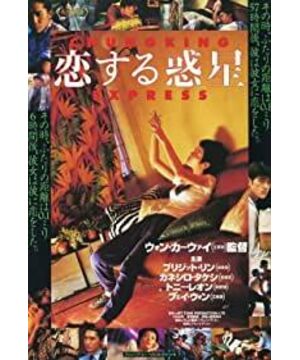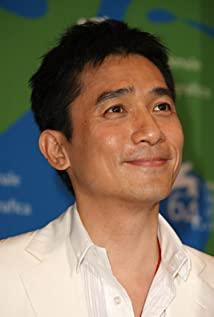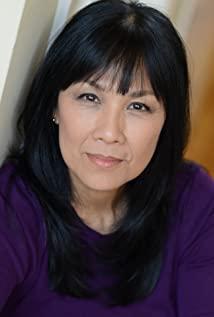By Amy Taubin
translated by Faust
"Chungking Forest" (1994) is "Men, Women" in the 1990s (Godard's 1966 film, in which Godard proposes to the French youth of the time " Marx and Coca-Cola's Viewpoint), a pop-art film about some 20-somethings looking for love in Hong Kong, a city that has overtaken Paris as the most creative film city. Wong Kar-wai, like Godard's anatomy of the "Marx and Coca-Cola Generation" in the mid-1960s, paints a picture of the restless youth of the anxious and restless decade before the handover of Hong Kong's sovereignty. Both "Men, Women" and "Chongqing Forest" are the first time their respective directors have focused their lenses on the younger generation who are about 10 years behind them. They view this generation gap with a mild sense of distance and focus on the Shows the main problem facing this generation of young people: how they should deal with their own desires and confusion when interacting with the opposite sex.
Chongqing Forest was conceived by Wong Kar-wai during the long and difficult production gap for the martial arts film "Evil in the West" in order to quickly recover funds for the Zedong Company (a film company jointly founded by Wong Kar-wai and Liu Zhenwei in 1992). In fact, this film, which took only more than 3 months from start to finish, has a quirky temperament that is unique among his many works. Wong Kar-wai added some commercial elements to the film: the first half of the film is like a gangster movie, while the second half is full of pure and wonderful romance. The protagonists of both parts are police officers, and the film's four main actors are all box-office hits in Asia, including pop music icons Takeshi Kaneshiro and Faye Wong, Hong Kong movie stars Tony Leung and veteran actress Brigitte Lin (the only one in the film who is over 40). , who played a drug smuggler, her look in the film pays homage to another cult movie star, Gina Rowlands in Gloria. Let's compare this film again with "Men, Women", both of which are played by female singers who are sought after in youth pop culture, but unlike Chantal Goya in "Men, Women". Nakamoto played a pop singer, and Faye Wong played a female clerk in "Chongqing Forest." (Although her character is based on two songs that accompany her throughout the film, "California Dreamin'" by the Mamas and the Papas and a Cantonese cover of "dreams" by "singer" Faye Wong from the Cranberries "Dreamers".) The differences between the two films are minimal in terms of tactical details - both performers dance or lip-synch to their own tapes at certain points in the film, but The difference between Godard and Wong Kar-wai's portrayal of the two women in their works is quite large, with Goya's character always in a state of great narcissism and emptiness, while Wong Kar-wai's portrayal of Faye Wong's clerk Poured into the same amount of affection as the police played by Takeshi Kaneshiro and Tony Leung.
This film has achieved remarkable results in Asia and swept the Hong Kong Film Awards (Chongqing Forest won four awards for Best Picture, Best Director, Best Actor and Best Editing at the Hong Kong Film Awards in 1995. Tony Leung won the first Academy Award for Best Actor) and also won a good box office. However, the box office was not good in the United States, which is probably the same as the North American distributor of the film, Mirame, for positioning the film recommended by Quentin's Rollin Thunder (the company's name comes from Quentin's favorite film of the same name) as a literary film. Exploitation films (“exploitation films” mostly refer to low-budget, crudely produced erotic, violent, horror B-movies. Probably Quentin’s tastes and the film noir shell of the first half of Chongqing Forest gave Mirame this illusion bar) get confused about it. Still, it proves that this combination of gunfire and romance has an irresistible appeal to audiences. "Chongqing Forest" earned Wong Kar-wai the title of the most charismatic and complex art film director since Godard. In fact, the shifting trend that the film emanates also marks what will be a turning point in Wong Kar-wai's directorial career, when the disconnected gangster revenge story is gradually replaced by a simple psychedelic love story. In Pauline Kael's 1966 review of Men, Women, she remarked that "Godard, within the framework of American gangster films that had limited his cinematic approach and his connection to the real world, Expressing his own views on the younger generation of today.” Wong Kar-wai did the same in the Chongqing Forest, and he even completely separated the two stories of the film in the middle to emphasize the sense of alienation.
"Chongqing Forest" consists of two distinct and independent stories that, although somewhat connected in theme, have their own distinct characters and settings. (If you watch carefully, you can find that the two characters of the second story also appeared in the first part. Faye Wong came out of the convenience store with a Garfield doll and Tony Leung was on duty at the flyover.) The first story continued The director's debut film "Carmen Mong Kok" added some elements of gangster action, and the second story foreshadowed his romantic and lustful films "In the Mood for Love" (1997) and "In the Mood for Love" in the following years. (2000) and the appearance of 2046 (2004). "Evil in the East and West Poison", which was finally completed shortly after "Chongqing Forest", has the appearance of a martial arts action movie, but its core is free from the edge of abstract artistic conception. (In the 2008 remastered version of East Evil West Poison, Wong Kar-wai removed some action scenes and connecting plots, making the whole story more esoteric.) And then in "Fallen Angels" (1995), Wong Kar-wai originally conceived As the third part of the story of "Chongqing Forest", but it was finally spun off and established as a film, its exaggeration and confusion are not only because the photographer Du Kefeng used a lot of quick close-ups of fisheye lenses, turning the originally handsome and beautiful men and women in his film into a group of The freak with the banana nose, but also because it mixes gangster violence with crazy love, with all the elements you can imagine in a film noir. Wong Kar-wai's reputation as an art film director only began to grow in his three later opera-like romances, "In the Mood for Love", "In the Mood for Love" and "2046", partly because of his previous genre films. It was never really embraced by canon art film, and on the other hand because the director's signature emotional narrative rhythm and rich audio-visual feel didn't fully mature in his early works.
Every part of Chungking Express's plot features a cop in lovelorn syndrome struggling with his ex-girlfriend until another woman captures their hearts. The story can be thrilling, and in the first part, it opens with Wong Kar-wai's label-shaking chase scene through the crowded corridors and dead-end alleys of Chungking Mansions. Filled with cheap hotels, discount stores, and smuggling "import-export" businesses, this is the kingdom of criminals and poor people in the port city of Hong Kong, which in a sense is a dead end in itself, one less than 40 minutes later. Where the director gave up for a more hopeful romantic plot. The movie itself seems to use the same method as the characters in the film - constant trial and failure, to find love. The protagonist of the first part is a plainclothes policeman, number 223, who runs as fast as he can in the opening chase scene and quickly apprehends the escaped prisoner, which is pretty much the only shot of him in the entire film that is related to his profession. Basically, everything 223 does in the film stems from the confusion caused by being dumped by his girlfriend May on April Fools' Day. 223 gave Ah May one month to return to him before his 25th birthday on May 1st. He counted down the day by buying canned pineapples that expired on May 1 (from his own voice-over, May likes pineapples). If he doesn't get a call from her on his birthday, the relationship will also expire. We have no way of knowing if May (whom we didn't even get to see in the movie) knew, or if she knew, would care about this ultimatum.
But canned pineapples and their looming shelf life, and the multiple meanings and associations that 223 is loaded with, are like an illusory goal. Ah May is 223's first girlfriend, but if he wants to enter a new stage in his life, he must give up his love for her ("I don't know when to start, everything has an expiration date?" He thoughtfully said), birthdays, became a transitional sign of this transformation. The sweetness of mass production of canned pineapples makes 223 think of this short-lived love. Only a few hours away from May 1st, he realized that his love was about to expire, he tried to feed these sweet pineapples to his dog like May, but it was ridiculous to him. Ritual enthusiasm expresses no interest. 223 indulged himself by eating all 30 cans of canned pineapple, hoping to turn his heartache to his stomach. After vomiting, he decided to forget the pain of the past and fall in love with the next woman he met.
223, who wandered in vain in his social circle hoping to find a woman to accompany him, is undoubtedly in the middle of another countdown: In 1994, only three years before the handover of Hong Kong sovereignty, the film's anxiety about sex and romance is just a cover , the director wanted to express the fear that a deeper level of political freedom—and even an entire way of life—will soon expire. The most striking difference between "Men, Women" and "Chongqing Forest" is that the former is full of constant political activity and political chatter, whereas in the latter you won't find that. This difference reflects the changes in youth culture from the 1960s to the 1990s. It does not mean that Wong Kar Wai is a director who does not care about politics. On the contrary, he is like an Eastern European filmmaker under the Soviet regime, or he is more like himself at the same time The contemporary mainland director used metaphors to express his political views.
A more intuitive aspect of the collective anxiety of Hong Kong people before the handover of sovereignty comes from the situation of a gangster woman with a golden wig played by Brigitte Lin, who learns that her time is running out from a slipped can of sardines marking May 1. Much more, (this sardine can also appears in the final scene after he kills the courier) If she can't retrieve the drugs stolen by the cooperator who cheated on her by this day, she will be killed. In the opening chase scene where she bumps into 223 and hurries away, a smart cop would realize on the spot that her wig, sunglasses and trench coat are a disguise, but 223 doesn't, otherwise, "57 hours later" When they meet again at the bar, he will probably arrest her. His eyes were blurred, and like many other Wong Kar Wai films, 223 fantasized that he was in love with her because of a feeling of deja vu. Then they curled up on the bed in the hotel room, she fell asleep quickly, and he ate four chef's salads while watching Cantonese scraps (there is hardly a scene in the movie left to eat), before leaving the room, he took off She took off her high heels, washed and polished them, and placed them by her bed. Their relationship is absolutely pure, yet it's that little tenderness that allows them to relax from each other's troubles—she has to deal with a lost drug while he forces himself to start finding love all over again.
Chungking Express, the title released in North America is not a direct translation of the title of the film when it was originally released in Hong Kong. Chungking Express alludes to a composite space that exists only in movies or dreams - Chungking refers to Chungking Mansions, the main scene of the first part of the story, and Express refers to the Midnight Express, which is the second part of the story The name of the popular takeaway food store in . In fact, the Midnight Express store had already appeared in the first part - 223 had responded to his pager here (his paging code was "Love you for ten thousand years") to see if May had called him. When he was frustrated to find out that May had not contacted him, the owner of the takeaway store tried to introduce a clerk in the store, also named May, to 223, but 223 was not interested at the time. When he spends a night with the mysterious blonde woman played by Brigitte Lin, he returns to the store again. The clerk May has left to go on a date with someone else. The boss suggests that he try to date the new clerk Faye (Faye Wong), but 223 Accidentally saw an Indian man cleaning a window. "I don't like men." Confused with disappointment—even a little goofy, 223 proved that he wasn't ready for a new relationship at all. He left the Midnight Express and was never seen again in the film. From the point of view of the film's narrative, his story is over.
Come to this story of the uniformed policeman 663 (played by Tony Leung) who often goes to the midnight express to buy a chef's salad for his flight attendant girlfriend. Wong Kar-wai gave Tony Leung, the man who was about to change his film style, a very charming opening. On the surface, the camera just follows Faye's angle, but when 663 steps into the close-up, Faye is by no means the only one who immediately feels the magic of the most soulful eyes in contemporary cinema. However, there are still people who are immune to his charm, and soon 663, like 223, is abandoned by his girlfriend. Faye, using his ex-girlfriend's key left in the store, entered his apartment while 663 was patrolling. It is also secretly sneaking into the other party's apartment to clean up the room. What Faye did did not make people feel as full of desire as Li Jiaxin in "Fallen Angel", but, in all other Wong Kar Wai movies, there is no such thing as Faye in the movie.
Comparing "Baby Story", 663 is like the character played by Cary Grant, silent and introverted, while Faye Wong is undoubtedly as emotional and direct as Katharine Hepburn's character. 663, completely lost in the pain of his lovelorn, speaks to a bar of soap instead of communicating with the outside world. He didn't know that Faye had fallen in love with him, and he didn't realize that she had been secretly remodeling his apartment until they met face to face at the door of his apartment - she was about to leave, and he had just returned, when Faye saw 663, Her reaction was so flustered, she slammed the door into the house and hid. This may be the only moment in Wong Kar-wai's film that can make you laugh out loud. The two actors call in this way, their brief reunion scene is even more charming, he has the simplicity and innocence rarely seen in Wong Kar-wai's work after this film, but unfortunately, after this short and euphoric joy, who knows this. How long can a relationship last?
View more about Chungking Express reviews











